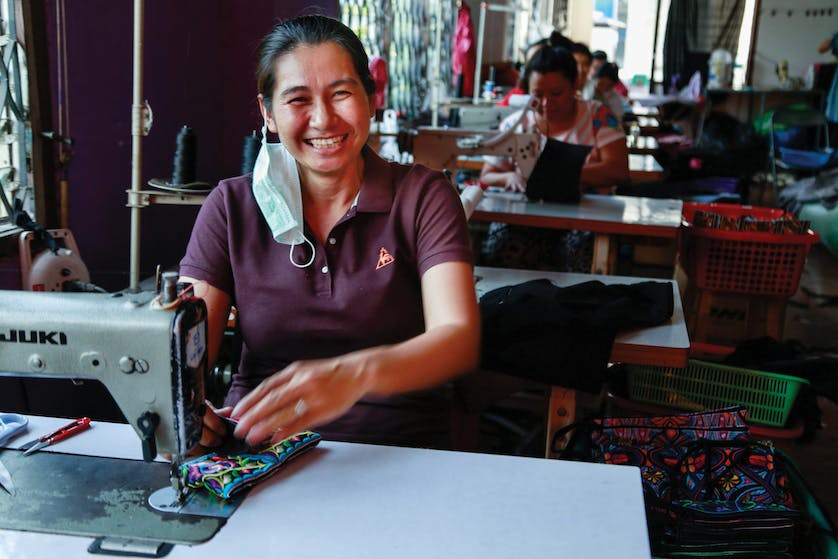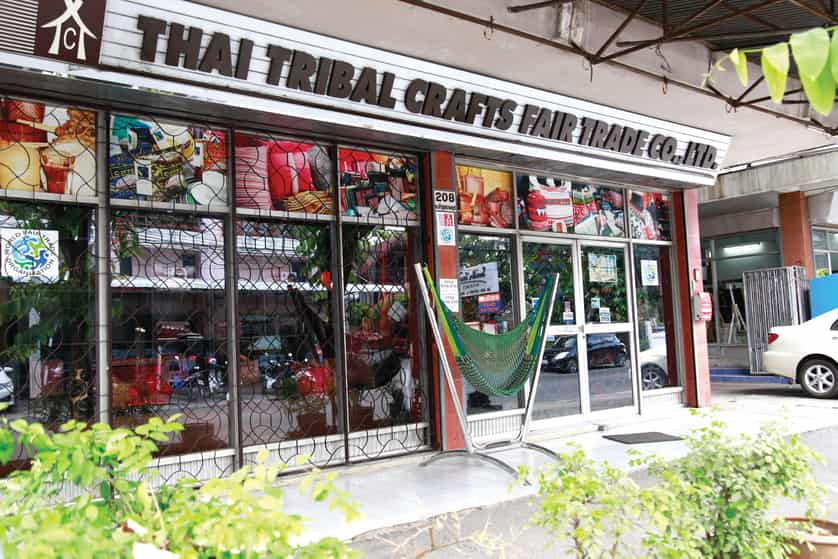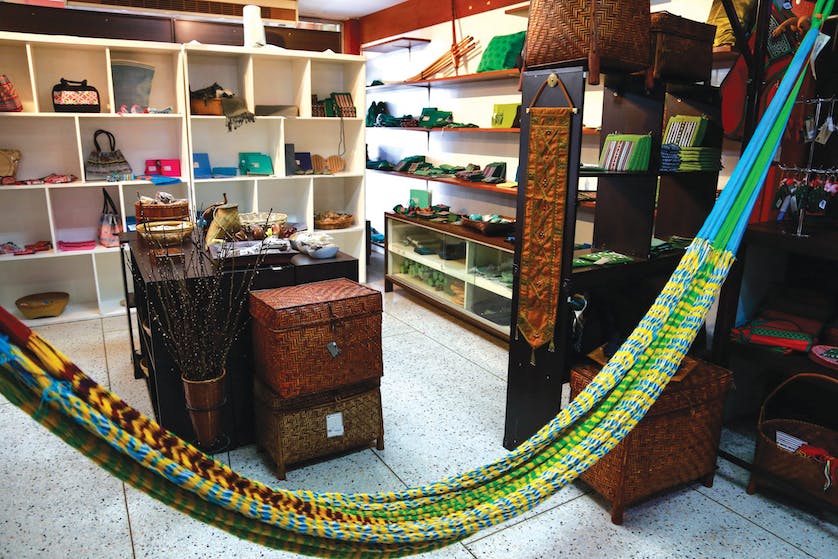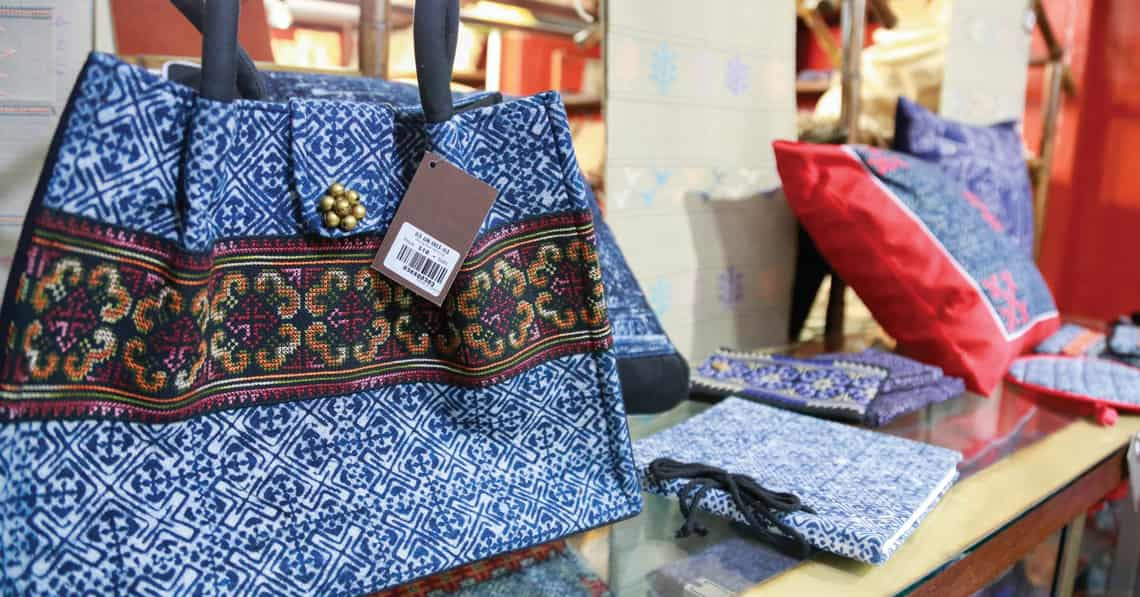It’s no secret that the fashion industry has a dark side. As our world becomes more consumed by consumption, demand for products to be produced faster, en masse and cheaply, rises. In order to meet these demands, basic human rights are often lost in the process.
Between the 18th and 24th April, Chiang Mai joined 70 countries in the Fashion Revolution Week aimed at raising awareness about the real and great impact the fashion industry has on the voiceless masses who toil, often under unacceptable, if not dangerous conditions to produce our newest purchases. Created after 1,134 workers were killed in a garment factory collapse in Bangladesh in 2013, Fashion Revolution Week challenges us all to take a deeper look at where our clothing comes from.
Although Fashion Revolution week lasts only 7 days, Fair Trade business can have a year-round presence in our city. Fair Trade businesses seek to do things differently by striving to prioritise human rights over making a profit.
Christine Gent, Executive Director of the Asia branch of the World Fair Trade Organisation (WFTO) and Country Coordinator for Fashion Revolution Thailand describes Fair Trade as a social movement that “focuses particularly on the economically disadvantaged and marginalised producers who are selling products, ensuring fair prices, and high social and environmental standards.
Here at Citylife, we wondered how Chiang Mai fares in this Fair Trade business world and set out to interview three different Fair Trade businesses as well as WFTO-Asia to find some answers.
Altruistic Beginnings of Chiang Mai Fair Trade
How does a business come to adopt Fair Trade practices? It seems for three of the organisations in Chiang Mai that responded to emails asking for an interview regarding fair trade practices, all agreed that it is simply the right thing to do.
“Our founder, Carlos Mantilla, fell in love with the country, Thai people, the culture, and the products he was seeing in the markets. I guess he thought the rest of the world should see this too,” Lara, the Sales Manager at Ethnic Lanna explained.
Founded in 2009, Ethnic Lanna makes Fair Trade handbags, jewellery and clothing to export. Most of their products get sold overseas, but there is also a small shop in the old city to cater for local buyers. Their Fair Trade policies extend to all the staff, from source to sales.

Another organisation that adopts the Fair Trade model is the Thai Tribal Crafts Fair Trade Company (TTC). Founded on the principles of Fair Trade well before it was popularised in the west, TTC provides opportunities for improving the quality of life for tribe people of Northern Thailand. In the 1970s, Christian missionaries began bringing home and selling handicrafts they had picked up while in Thailand, sending all of the profits back to Thailand. Out of that, TTC was born with its rule of operation – that the business must always be described as a self-help non-profit endeavour that is not designed to make anyone richer, but instead to help many have a good life.
The third company focuses more on sustainability, by converting the waste faeces of elephants into environmentally friendly paper. Aptly named the Elephant POOPOOPAPER Park, they claim to also incorporate Fair Trade practices into their business model because they believe it is simply the right thing to do.
“We do what is supposed to be right, we treat people right. We treat them the way we want to be treated, so that’s what it is. That’s what we do here,” said Kanokrat Flancman, the managing director of the park, who believes that their Fair Trade principles reflects their general approach to life.
The Reality of the Practice
From the definition of Fair Trade, it’s hard to gauge what the practices actually look like. For the businesses we interviewed, it seems there is a focus on providing workers’ rights, rights which are pretty much a given in Western countries, but still not applied universally, or even widely, in many Thai businesses, especially in the crafts sector.
All three companies believe in providing safe working conditions, hiring locally, paying at least the minimum wage, and granting both holidays and multiple days off for their employees.

At TTC, hill tribe artisans act as their own boss in multiple ways. When it comes to orders, artisans are able to set their own prices, determine their own deadlines, and work out of the comfort of their own homes. And when it comes to company matters, the artisans call the shots. The missionaries who started TTC always intended for the business to belong to the artisans. Today, the company remains under the control of their Board of Directors. There is still a missionary presence on the board, but the operation of the business is entirely in the hands of the tribal people.
Elephant POOPOOPAPER Park goes beyond the basic Fair Trade principles by employing a large amount of Burmese minorities. To hire these people legally requires a lot of paperwork; something other companies typically shy away from. The Park even provides loans with low to no interest for employees who lack a credit score.
A woman called Natcharan, an artisan and mother of two, originally from Sukhothai, has been working with Ethnic Lanna for two months.
When asked, Natcharan explained how working at Ethnic Lanna has already improved her life. Weekends, holidays, and nights off allow her to visit her children more often than with her previous job, and a stress free work environment and increased pay also allow her family to thrive. Not to mention, all the new skills Natcharan has learned working with Ethnic Lanna.
The Challenges
Despite the many benefits, there remain many challenges for businesses practicing Fair Trade.
For Thai Tribal Crafts, many people stumble into their store not knowing what Fair Trade is, and being confused as to why these goods are more expensive than at the Night Bazaar. Lara at Ethnic Lanna explained that their business deals with similar issues. Customers frequently ask for a discount, to which she often responds, “If I give you that discount, then it won’t be fair trade.”
And for those who do know about Fair Trade, there is a chance they may have gained a negative idea from media criticism in recent years. An article in the Guardian last month described how with the multitude of different Fair Trade labels out there, it is hard for consumers to understand what good actually comes from the products they are buying.
Additionally, as Fair Trade becomes more of a trend, a growing number of businesses are claiming to be Fair Trade only to make more profit.
“Today green is the new black,” explained Gent from WFTO-Asia. “The words fair, fairly and sustainable are used in marketing and greenwash talk. Organisations brand their products as fair trade to increase purchasing power, which lessens the trust in organisations that are genuinely fair trade without certification.”
One solution to this challenge is to become a certified member of the WFTO, whose Asia branch recently moved to Chiang Mai.

Working with the WFTO
Our hunt for Fair Trade businesses in Chiang Mai began with a search on the World Fair Trade Organisation website. Created in 1989, the WFTO works in over 70 countries with roughly 320 organisations.
Certified WFTO organisations receive their Fair Trade sticker, which serves as validation and helps with international brand recognition. Three companies in Chiang Mai qualify for certification, Thai Tribal Crafts being the only one we could get in contact with.
Thai Tribal Crafts (TTC) became a certified member of the WFTO in 2002. “We’ve been of a like-mind with WFTO for decades so we really find there’s just a great synergy between what they are trying to do and what we are trying to do,” Managing Director Jon Brooks explained.
“We didn’t become a member just by claiming (to be Fair Trade). There was a process. There is a detailed check in process that provides legitimacy,” Elias Maung, Marketing Manager at Thai Tribal Crafts also noted.
According to Gent, this process includes legally existing as a business for two years, having a constitution that reflects their social, environmental, and business objectives, demonstrating compliance with the 10 WFTO Principles of Fair Trade through an audit, and a membership fee that starts at 500 euros per year.
For Elephant POOPOOPAPER Park and Ethnic Lanna, the costs outweigh the benefits with the WFTO.
“We don’t want the Fair Trade to control us, we want to basically do what we would like to do so we can pursue our dream,” Kanokrat explained.
Although Elephant POOPOOPAPER Park is not a member of the WFTO, they are the only Thai licensed partner of the World Wildlife Fund. To receive this license, the park jumped through many hoops, such as proving that their business practiced Fair Trade when it came to employees, such as hiring locally and paying fair wages.
At Ethnic Lanna, they believe adapting their business to the WFTO standards would actually prevent them from helping their artisans as much as possible.
“In order to be accredited, everything you use as a business has to be Fair Trade – down to the needle and thread. We would have to import (the supplies) and pay custom fees. The profit we make is all returned to the artisan. So the less we make, the less we have to give them. It wouldn’t make any sense to go that extra step.
“We wouldn’t be able to afford to keep some artisans on. We would have to stop working with them, and take away their livelihood,” explained Lara.
“Ultimately, it doesn’t matter to us if WFTO refused to certify us, we have enough proof around us. We are going to continue to help people instead of changing something that we know would be detrimental. We believe that we are practicing Fair Trade and we believe the most important thing is to help people who are helping you. Isn’t that what it’s all about?”
The Future of Fair Trade
The future looks bright for Fair Trade business in Chiang Mai. With WFTO’s recent move to the north and the ever-growing flow of tourists throughout the city, there are lots of opportunities for Fair Trade business to expand.
“I think there is plenty of room for more Fair Trade business, and I would welcome that,” said Brooks.
These businesses have exciting plans for the future as well. TTC hopes to introduce weaving classes for interested tourists in the upcoming year. By teaching the difficult and time-consuming craft of weaving, TTC hopes to educate more tourists on the work that goes into all handmade crafts. And at Ethnic Lanna, they are about to launch a line of elephant themed products, where a portion of the profits will benefit elephant camps in Northern Thailand.
To really get the Fair Trade train going, more people need to become familiar with the practice.
“Come take a look. See what high quality Fair Trade handicraft items look like. Come see why we are proud to be who we are,” said Brooks, inviting our readers to come visit one of their two locations within the city.
And for those who already support Fair Trade businesses, they can find peace of mind with these final words from Lara at Ethnic Lanna.
“By helping us to continue as a business and paying fairly for the product, without a doubt they are helping hundreds and hundreds of people who without doubt live on the poverty line. It’s a simple as that.”
Ethnic Lanna
ethniclanna.com
Thai Tribal Crafts Fair Trade Co.
ttcrafts.co.th
Elephant POOPOOPAPER Park
poopoopaperpark.com
